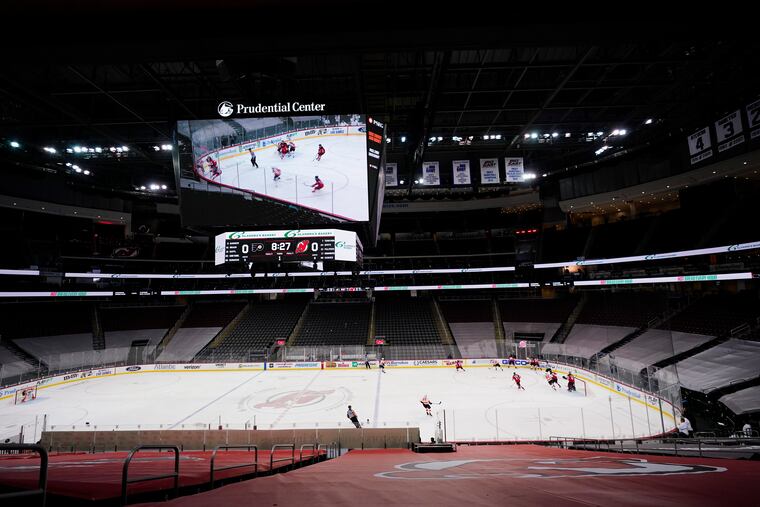N.J. eases restrictions on churches, stadiums | Coronavirus Newsletter
Plus, COVID-19 led to a drop in heart surgery, with grim consequences

TL;DR: New Jersey will allow a limited number of people back into stadiums and arenas, Gov. Phil Murphy announced. At the start of the pandemic, heart surgeons warned that fewer people were coming in for cardiac procedures, in some cases dying as a result. In a new nationwide analysis, researchers determined that the consequences may have been even worse than many realized.
— Kelly O’Shea (@kelloshea, health@inquirer.com)
What you need to know:
📈 The United States reached a grim milestone Monday: recording 500,000 deaths from the coronavirus. In Philadelphia, Black residents have died of the virus at a higher rate that white residents, according to statistics from the city.
😷 For West and Southwest Philadelphians, a coronavirus vaccination clinic will be held at the Francis J. Myers Recreation Center in Kingsessing on Saturday.
☎️ Philly hospitals find phone calls are proving more effective than digital platforms at getting eligible patients registered for vaccines.
💉 Pennsylvania Gov. Tom Wolf said Monday that the commonwealth is doing “an okay job” at inoculating residents but must do better, especially when it comes to vaccinating people of color.
💸 President Joe Biden is tweaking the Paycheck Protection Program to assist the nation’s smallest businesses and take steps to further equity.
👩🏫 Philadelphia teachers began receiving COVID-19 vaccinations through the Children’s Hospital of Philadelphia Monday.
📰 What’s going on in your county or neighborhood? We organized recent coverage of the coronavirus pandemic by local counties and Philly neighborhoods mentioned in the stories to make it easier for you to find the info you care about.
Local coronavirus cases
📈The coronavirus has swept across the Philadelphia region and cases continue to mount. The Inquirer and Spotlight PA are compiling geographic data on tests conducted, cases confirmed, and deaths caused by the virus. Track the spread here.
New Jersey will allow a limited number of people back into stadiums and arenas, Gov. Phil Murphy announced Monday. Murphy said venues with a capacity of 5,000 will be permitted to allow in 10% of their capacity, beginning March 1. Outdoor venues will be permitted to have 15% of their capacity. Murphy said he’d be “shocked” if those numbers weren’t increased dramatically by the time the NFL and college football seasons begin in the fall. Additionally, houses of worship can now go from operating at 35% to 50% capacity, provided that attendees wear masks and adhere to social distancing.
At the start of the pandemic, heart surgeons warned that fewer people were coming in for cardiac procedures, in some cases dying as a result. In a new nationwide analysis, researchers determined that the consequences may have been even worse than many realized — particularly in hard-hit hot spots in New Jersey, New York, and Pennsylvania. During April, the number of heart surgeries plunged by 71% in those three states, when compared with monthly averages in 2019. And those who did undergo heart surgery were less likely to survive it, according to the analysis. Read more here.
Helpful resources
Where can I get a COVID-19 vaccine in the Philly area? Use our lookup tool.
What to know about face masks, including whether to double up and when it might be time to replace yours.
Symptoms of COVID-19, flu, common cold, and allergies can overlap. How to tell the difference.
Here’s how to avoid coronavirus vaccine scams.
You got this: Showing appreciation
After Penn closed its campus in March, a group of students began brainstorming ways to provide community service, and Lockdown Letters, an initiative to send notes of appreciation to front-line workers such as doctors, nurses, and teachers, was born. It’s collected more than 13,000 letters that have reached front-line workers in more than 40 states.
🙇♀️ Burned out from working at home? Reset your body with these quick stretches.
📍 Apps and maps bring the Underground Railroad to life for students in this South Jersey town.
🤔 Can COVID-19 cause erectile dysfunction? A urologist explains the science.
Have a social distancing tip or question to share? Let us know at health@inquirer.com and your input might be featured in a future edition of this newsletter.
What we’re paying attention to
A federal government watchdog is sounding the alarm about increasing telehealth fraud during pandemic, Stat reports.
The New Yorker asks: Why does the pandemic seem far deadlier in some countries than in others?
When will we return to normal? The question looms as Anthony Fauci says mask-wearing may continue in 2022, The Washington Post reports.
Enjoy getting our journalism through email? You can also sign up for The Inquirer Morning Newsletter to get the latest news, features, investigations and more sent straight to your inbox each morning Sunday-Friday. Sign up here.